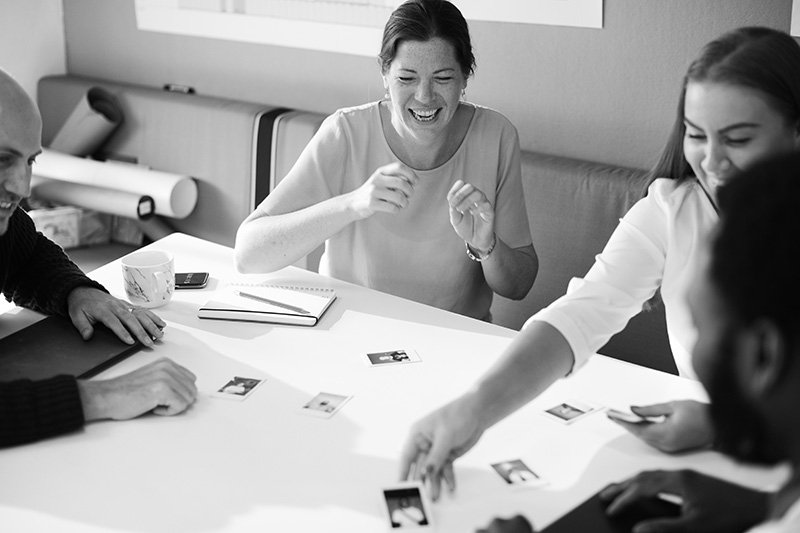What You Can Say to Become a Good Listener
Written by: Megan Smith / Communication / September 2019
What is Active Listening: Many people who visit the Well Said clinic say that they are worried about their listening skills. When other people finish speaking, they are not sure how to respond in a way that will let the speaker know they paid attention and cared about what they were saying.
Many people focus on what they do while their conversation partner is speaking. They think: “Am I looking at them?” “Does my face seem attentive?” “Am I nodding and saying “Mhm!” in the right places?”
These skills are absolutely important, but making your coworker, friend or loved one feel heard is often more about what you say after the fact.
So what is validation, anyways? In its essence, it is about making the other person feel that they are being reasonable. Many people worry that their feelings, ideas, or behaviours are not “correct” for the situation, and being told that what they have said or done makes sense will relieve some of that worry, and strengthen your relationship.
Contrast this with invalidating someone, or making them feel that their thoughts, feelings or behaviours are unreasonable. Which of these people would you rather be?
You: I am worried about the way this project is going. Some people haven’t been checking in about their progress, and we may be running behind.
Your coworker: Maybe if you were better to work with, they’d spend more time meeting with you.
You: I am worried about the way this project is going. Some people haven’t been checking in about their progress, and we may be running behind.
Your coworker: You should go check on them, then.
You: I am worried about the way this project is going. Some people haven’t been checking in about their progress, and we may be running behind.
Your coworker: It’s so frustrating when a big project like that feels like it’s completely out of your hands.
When you are on the receiving end, it is easy to tell when someone else is listening to formulate a response that prioritizes their own emotional state, rather than a response that prioritizes yours.
How To Validate
Knowing that it is important to respond to others’ feelings and knowing how to do so are very different skills. However, there is some good research in the field of psychology that can help. Psychologists and psychotherapists have studied the skill of validation in depth, because it is an integral part of their profession. We can all benefit from their wisdom.
One way of thinking about validation is using the levels described by M. Linehan. I often ask my clients to do a little research about the different levels, and have discussions about which levels they might use in different situations. The names used here are similar to and described by , but different from the therapy-oriented names that she originally provided for them.
1. Listen. The most basic way to validate someone is to listen to them without judgment. This requires no response at all.
2. Reflect their message. To do this, repeat the person’s message back to them without adding any judgments (not negative judgments, and not positive judgments either). An example for the dialogue above might be “It sounds like they’ve been difficult to get a hold of.”
3. Interpret. Say the feeling that they did not verbalize. For the example above, it could be “That sounds really frustrating.”
4. Give historical context. Explain that any person with their history would feel the same way. For example, “Given that your last few deadlines were delayed by other people’s late work, it makes sense that you’d be worried!”
5. Give general context. Explain that people in general would likely feel the same way in that situation. “Being worried makes sense – waiting for other people is absolutely stressful.”
6. Be radically genuine. The most effective form of validation is to essentially say “I’ve been in your shoes, and I have felt the same way.” It differs from the other levels because you are sharing the feeling, rather than providing reasons why it might, in theory, make sense. For the example statement above, an empathic response might be “I hate it when that happens to me.”
You likely already do many of these things! Validation can come more easily in some situations (e.g. complaining to a friend about something you both dislike, speaking to a coworker who agrees with your methodology for a project, etc.). This type of validation tends to be empathic. In situations where people do not empathize or cannot understand the feelings of their conversation partner very well, choosing a lower level may be appropriate. However, it is important to choose the highest level possible in any given situation, to provide the best possible support for your conversation partner.
Troubleshooting
Now that you know how to validate others, your problem is solved! You can just go out into the world and start practicing. Consider this the end of the blog post.
Of course, that was a joke. Knowing what to say to make someone feel better and succeeding in your attempt to do so can be quite different. Some of the factors that can lead people to fail when they apply this skill include:
Their own opinions. Validation can often feel easy when you agree with someone, but being understanding and accepting of a person’s opinion when you do not share it can be much more difficult. If I bike to work and advocate for new bike lanes to be installed, but my friend is against adding bike lanes to streets, I can still understand his perspective. Perhaps his commute is long and he fears it will take longer still if cars have less road space. Or perhaps he is afraid of unpredictable cyclists entering his lane. I do not need to share his opinion to understand why he holds it and let him know that I think his feelings are valid.
Defensiveness. Perceiving someone else’s opinion as criticism can make defending yourself the top priority, and cause validation to be forgotten entirely. If a coworker raises a concern about the workplace that I feel reflects my behaviour, I need to take a step back and see things from their perspective. Validating their concern before explaining myself will make our relationship much better in the long run!
There are other things on their mind. Your own personal stress levels or degree with preoccupation with the goings-on in your life will affect how much energy you have to dedicate to someone else. Sometimes, if I am very stressed out, I will forgive myself for putting less energy into responding to others. At other times, I will decide to “take turns,” by setting my needs aside for a few minutes, and then seeking validation for my concerns after I have finished listening to my conversation partner.
By recognizing and overcoming some of the obstacles that prevent you from listening well and validating your conversation partners, you can become a much better conversationalist, and a better friend, lover, and colleague.
For additional information, see:
Linehan, M. M. (1997). Validation and psychotherapy. In A. C. Bohart & L. S. Greenberg (Eds.), Empathy reconsidered: New directions in psychotherapy (pp. 353-392). Washington, DC, US: American Psychological Association.
If you would like to practice your emerging validation skills with a trained speech-language pathologist, you can book an initial consultation at the clinic using the link below, or by calling (647) 795-5277.








A constant perspective I hear from bilingual individuals, particularly those whose first language isn’t English, is that they feel inferior. That having an accent and speaking another language puts them at a disadvantage for building connection, respect and growth as communicators both personally and professionally.
This article will demonstrate why that is not true. It will demonstrate that you as a multilingual speaker are at an advantage - even when it doesn’t feel like it. In this article, the term bilingualism will be used to embody both multilingualism and bilingualism.